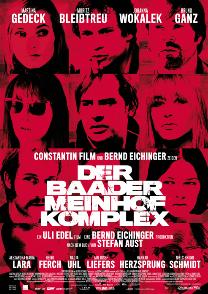The Baader Meinhof Complex
| The Baader Meinhof Complex | |
|---|---|

Theatrical release poster
|
|
| Directed by | Uli Edel |
| Produced by | Bernd Eichinger |
| Written by | Bernd Eichinger Uli Edel |
| Based on |
Der Baader Meinhof Komplex by Stefan Aust |
| Starring |
Moritz Bleibtreu Martina Gedeck Johanna Wokalek |
| Music by | Peter Hinderthür Florian Tessloff |
| Cinematography | Rainer Klausmann |
| Edited by | Alexander Berner |
|
Production
company |
|
| Distributed by |
Constantin Film Verleih (Germany) Metropolitan Filmexport (France) Bontonfilm (Czech Republic) |
|
Release date
|
|
|
Running time
|
149 minutes 164 minutes (Extended cut) |
| Country | Germany France Czech Republic |
| Language | German English French Swedish |
| Budget | €13.5 million ($19.7 million) |
| Box office | $16,498,827 |
The Baader Meinhof Complex (German: Der Baader Meinhof Komplex) is a 2008 German film by Uli Edel in his first directorial project since 2000's The Little Vampire. Written and produced by Bernd Eichinger, it stars Moritz Bleibtreu, Martina Gedeck, and Johanna Wokalek. The film is based on the 1985 German best selling non-fiction book of the same name by Stefan Aust. It retells the story of the early years of the West German far-left militant group the Rote Armee Fraktion (Red Army Fraction, or Red Army Faction, a.k.a. RAF) from 1967 to 1977.
The film was nominated for Best Foreign Language Film at the 81st Academy Awards. It was also nominated for the Golden Globe in the Best Foreign Language Film category.
On 2 June 1967, the Shah of Iran visits West Berlin and attends a performance at the Deutsche Oper. Angered at his policies in governing Iran, members of the German student movement protests his appearance. The West Berlin police and the Shah's security team attack the protesters and unarmed protester Benno Ohnesorg, is fatally shot by Officer Karl-Heinz Kurras.
Ohnesorg's death outrages West Germany, including left wing journalist Ulrike Meinhof, who claims in a televised debate that the democratically elected government of West Germany is a Fascist police state. Inspired by Meinhof's rhetoric, charismatic radicals Gudrun Ensslin and Andreas Baader mastermind the fire bombing of a department store in Frankfurt am Main. While covering their trial, Ulrike Meinhof finds herself deeply moved by their commitment to armed struggle against what they see as a Neo-Nazi Government. She secures a jailhouse interview with Ensslin and the two strike up a close friendship. Soon after, Meinhof leaves her husband for Peter Homann.
...
Wikipedia
